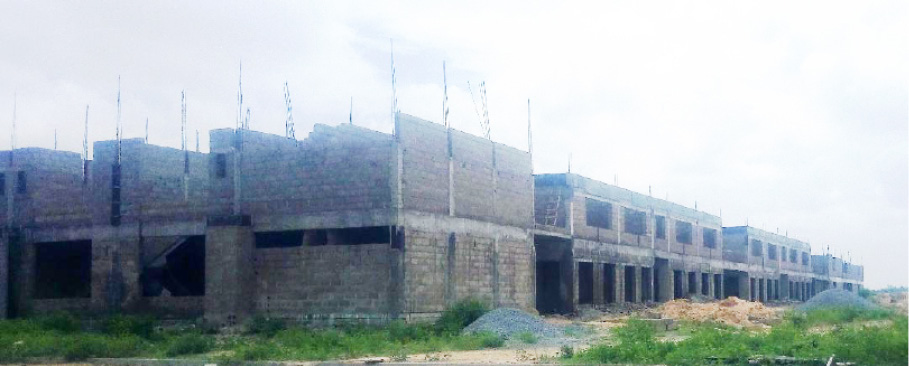Inside multi-billion naira Kano economic city
… Phase 1 ready by Dec – Developer The first phase of the Kano Economic City (KEC) project has reached 85 per cent completion, making the December, 2019, deadline for construction work to be completed realistic, Daily Trust reports. Conceived about 12 years ago by the administration of a former Kano State Governor, Malam Ibrahim […]

Ongoing construction work at the Kano Economic City.
Photo: Ibrahim Musa Giginyu
… Phase 1 ready by Dec – Developer
The first phase of the Kano Economic City (KEC) project has reached 85 per cent completion, making the December, 2019, deadline for construction work to be completed realistic, Daily Trust reports.
Conceived about 12 years ago by the administration of a former Kano State Governor, Malam Ibrahim Shekaru, and estimated to gulp about $461m, the project faced a major setback when the parties involved could not reach a balance in the financial agreement involved.
KEC is strategically located along the Zaria-Maiduguri Road, just a 15-minute drive from Kano Town.
Under a Puplic-Private Partnership (PPP) agreement, the KEC project was expected to be implemented in three phases spanning five to seven years under a joint venture partnership between the Kano State Government and a foremost indigenous real estate and infrastructure development company, Brains and Hammers Limited. Upon completion, the project will be developed under a Build, Operate, Own and Transfer (BOOT) arrangement.
The city was designed on a 117.2-hectare to provide over 80,000 Square Metres (sqm) of mega wholesale and retail warehouses and 10,000 shops and stalls targeted at harnessing product value-chain opportunities, as well as to improve economic growth.
KEC is designed to accommodate a World Trade Centre (WTC), a wholesale and retail market comprising state-of-the-art warehousing facilities totalling over 80,000sqm and over 10,000 wholesale and retail shops, an education institute, light factories/industries, a conference centre, banks, an office complex, a health center, police station, fire station, international coach station, a five-star hotel, among other modern facilities.
The developer, Brains and Hammers Limited, said the central components of KEC included, but was not limited to trailer and passenger motor parks, amusement park and petrol stations.
However, the project was said to have been abandoned for some years until the present Kano State Government under Gov. Abdullahi Umar Ganduje resolved to complete it under its bid to reassert the state as one of the leading economic centres in the country.
Gov. Ganduje made a commitment to see that the project comes to reality. After mobilising the co-partners to site, the governor recently visited the Phase 1 site of KEC; which when completed will house mega GSM and pharmaceutical markets.
He said, “My administration is particularly interested and determined to make a global city in Kano that can compete with other business cities in the world in order to have full and better economic potentialities and opportunities for the benefit of all.”
The Head of Design and Project Coordinator of Brains and Hammers, Arch. Muhydeen Afolabi, said his company would secure hybrid funding for the project, coordinate technical development and construction of the market, market various products, as well as services of KEC and discuss off-taker financing models with prospective financiers.
Arch. Afolabi added that the Kano State Government on the other hand, would provide land as equity contribution to the project, policy formulation and enforcement in respect to trade and commerce which would accelerate and support occupation of KEC.
Afolabi further revealed that the state government would lead the sensitisation of traditional rulers and the general public, as well as joint facility management of the market complex for a period of 25 years with an option of a renewal.
He said, “We have gone far on it, and as you are aware, the Kano State governor was here some time ago and he saw how far we have gone. The December deadline is realistic as all construction works have reached 85 per cent.”
Afolabi further said KEC had been designed to have 10,000 shops in Phase 1, 38 world class warehouses, 280-trailer capacity parking space, among other services needed in a world standard market, adding that the project also had provision for an agricultural hub that would house grains, a space for large and small scale industries, a leather processing unit, a meat unit and other commodities, with an up-to-date ICT centre, a hospital and offices for regulatory and security agencies.
